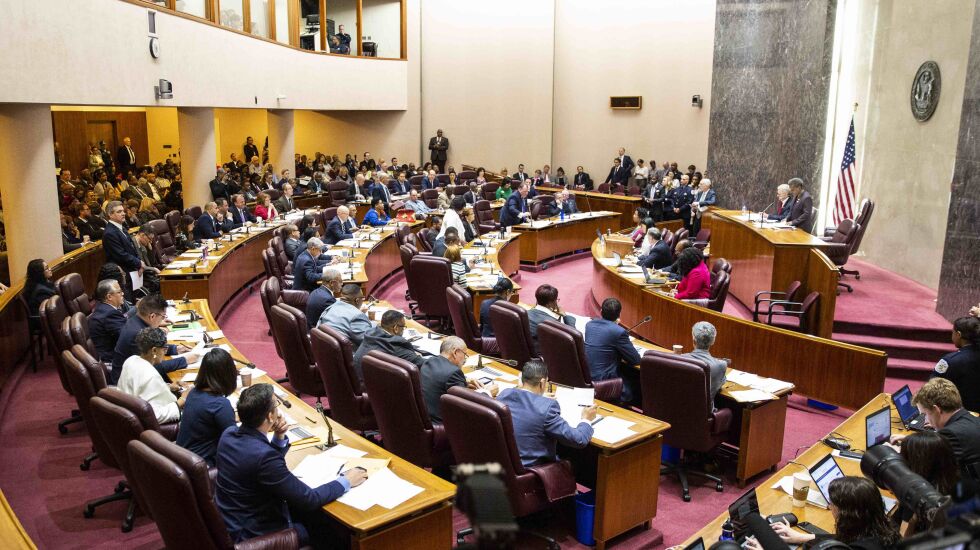
Ald. Andre Vasquez (40th) is not one of the 17 City Council members who, so far, have said “No, thanks,” to a nearly 10% pay raise this year. But that doesn’t mean he’s oblivious to the annual political dilemma. In fact, he’s proposing a solution to it.
At Wednesday’s City Council meeting, Vasquez is introducing an ordinance limiting future aldermanic pay raises to 5% or the inflation rate, whichever is less. The language is similar to the automatic escalator for property taxes that Mayor Lori Lightfoot pushed through council in 2021. The 5% cap would kick in when the new Council is sworn in next spring.
Vasquez did not return repeated phone calls or text messages about the proposal.
He is the second council member seeking to end the annual political dilemma facing Chicago alderpersons, one that could impact their re-election chances — particularly this year, when members must decide whether to accept a 9.62% pay raise.
That raise, tied to the rate of inflation, will boost the maximum salary for a Chicago alderperson to $142,772.
Mayoral challenger Ald. Ray Lopez (15th) also plans to introduce a pay ordinance. His would reduce the annual salary for alderpersons — both new council members as well as veterans who have accepted all the inflationary pay raises — from $142,772 to $120,000.
His version would cap future pay raises tied to the inflation rate at 3% and prohibit outside jobs, requiring alderpersons to serve their constituents full-time.
Last week, indicted Ald. Edward Burke (14th) and Ald. Samantha Nugent (39th) added their names to the list, making it 15 City Council members declining the pay raise. Burke made the politically-popular decision on the same day his wife, Illinois Supreme Court Chief Justice Anne Burke, announced her surprise retirement.
Burke and Nugent joined a list that already included Lopez and fourteen others: Daniel LaSpata (1st); Brian Hopkins (2nd); Nicole Lee (11th); Marty Quinn (13th); Matt O’Shea (19th); Silvana Tabares (23rd); Felix Cardona Jr. (31st); Carlos Ramirez-Rosa (35th); Gilbert Villegas (36th); Anthony Napolitano (41st); Brendan Reilly (42nd); Tom Tunney (44th); Matt Martin (47th) and Maria Hadden (49th).
Tunney, powerful chairman of the Council’s Zoning Committee, is one of eight veterans not seeking reelection. He is still considering joining Lopez and colleagues Sophia King (4th) and Roderick Sawyer (6th) in the crowded field of candidates seeking to deny Lightfoot a second term.
The retiring eight are among 15 of the Councils 50 members re-elected in 2019 who either already have left or announced they will be departing.
In 2006, the City Council approved a pay raise tied to the inflation rate and gave themselves political cover by passing the big-box minimum wage ordinance on the same day.
Then-Mayor Richard M. Daley subsequently used his first and only veto to kill the big box ordinance.
Ever since then, Chicago alderpersons have been forced to make an annual decision: whether or not to accept the annual increase or whether to decline it to curry favor with their constituents.
This year, the political predicament for alderpersons now earning $130,238 — if they have accepted all off the annual pay raises — is magnified by the economic struggles everyday Chicagoans face at the grocery store and the gas pump.
“In 2022, the consumer price index increased by 9.62 percent. As a result, the adjusted annual salary for aldermen will increase to $142,772 on Jan. 1, 2023,” Budget Director Susie Park wrote in an Aug. 15 memorandum to City Council members.
Mayoral challenger Willie Wilson is already using the aldermanic pay raise as political fodder, tweeting: “Here are the 17 aldermen who have declined the $12,500 raise. Is your aldermen on the list?”
Wilson has repeatedly dipped into his personal fortune — to the tune of $3.5 million and counting — to bankroll a string of gas and grocery giveaways.
He argued Monday a 5% cap is not nearly good enough. He argued the aldermanic pay raise should be “canceled entirely” and salaries for what he called a “part-time job” should be reduced to no more than $70,000.
“These people ain’t doing their jobs today. Crime is high. Inflation is high. This is no time for people to be taking any kind of raise. I don’t think the aldermen should make that kind of money when they’re living way above the average person in Chicago,” Wilson said.
“It’s a part-time job. Give me part-time job where I can make $140,000 a year and I can work another job. I’ll take that any day.”







